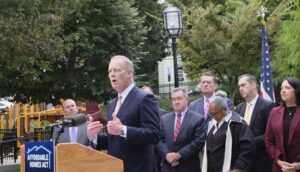
HYM Investment Group CEO Tom O'Brien speaks to reporters and supporters of Gov. Maura Healey's proposed housing policy and spending bill in Chelsea on Oct. 18, 2023. Photo by James Sanna | Banker & Tradesman Staff
For some of the key players in the debate over how to fix the state’s soaring housing costs, Gov. Maura Healey’s $4.1 billion package of policies and spending, unveiled Wednesday, comes down to whether or not it’s a good compromise.
So far among interest groups and advocates, Healey’s proposal to more than double state spending on housing production and preservation over the next five years has proved somewhere between uncontroversial and laudable.
“if today we were announcing a $1 billion bond bill, we would all be pleased. If today we were announcing a $2 billion bond bill, maybe we’d be a little impressed. Three billion? Now you’re talking. But $4 billion, some people might say that’s not possible!” HYM Investment Group CEO Tom O’Brien told a cheering crowd at the governor’s announcement of her bill in Chelsea on Wednesday. “Some people will say, Well, you can’t afford it. But the lack of housing production in Massachusetts is a very, very, very big problem and requires big thinking by a great team to fix that problem.”
But two major policy initiatives included in the bill are eliciting varying degrees of concern from some corners: a transfer tax on high-end homes and the legalization of accessory dwelling units on all single-family lots statewide.
Transfer Tax Draws Ire
The former would let municipalities vote to levy a tax of between 0.5 percent and 2 percent on real estate worth either more than $1 million or the county median home sale price, whichever is greater. The money would be dedicated to affordable housing development, the administration said. Sales between family members or government entities and sales for the purpose of developing affordable housing would be exempt.
“While we support the goals of the bill, we have deep concerns about the inclusion of a sales tax on real estate. It’s an unstable source of revenue that would cause more harm than good at a time when people and businesses are leaving the state because it is just too expensive,” Greater Boston Real Estate Board CEO Greg Vasil said in a statement emailed to the media immediately after Healey unveiled the bill. “We look forward to analyzing the details of the bill and working with the administration on our shared goal of creating more housing for the residents of this state.”
Vasil’s statement echoes attacks GBREB and others in the real estate industry have fired at more wide-ranging past proposals from elected officials in Boston, Nantucket and elsewhere, suggesting the idea is in for some opposition as Healey’s bill moves through the state legislature.
But asked following Wednesday’s event why he chose to vocally back Healey’s bill, despite the inclusion of a proposal some in the real estate industry have loudly opposed alongside measures that would seal tenants’ records for no-fault evictions or evictions solely for non-payment of rent, O’Brien characterized the legislation as an acceptable compromise that the real estate industry should support.
“The key is to get something done” on housing production, the developer behind the massive Suffolk Downs project in East Boston and Revere said. “We can’t just sit around and argue about the pieces.”
Concern Over Preempting Local Zoning
The transfer tax’s inclusion, meanwhile, may help get left-leaning legislators and advocates on board with the bill. It’s also “very exciting” to the Massachusetts Municipal Association, the lobby group that represents the state’s 351 local governments, said CEO Adam Chapdelaine.
While the MMA and its members are waiting to see the text of the bill – Healey did not appear to have filed it Wednesday morning – Chapdelaine said the administration’s inclusion of a provision that would preempt local zoning and legalize accessory dwelling units, or ADUs, on all single-family lots statewide without any special permit or zoning variance process, regardless of lot size, gave him “concern.”
Healey administration officials described the measure as leaving room for towns and cities to pass “reasonable” local dimensional and setback zoning regulations governing these ADUs, but said the bill would let these units be as big as 900 square feet and would ban both owner-occupancy requirements and parking requirements if the ADU was within a half-mile of public transit. All other ADUs could be required to have at most a single parking spot. The administration thinks the measure could create up to 10,000 ADUs statewide over the next five years.
“It’s not an opposition to ADUs, but it’s supporting local government setting their own rules and designing local solutions,” Chapdelaine said adding that as the MMA weighs the bill’s components it, too, is trying to decide if the bill represents a good compromise.
More Aggressive Reforms Still Possible
For housing advocates who had pushed the Healey administration to go further in its policy proposals – banning parking minimums in new developments near public transit, for example – the bill’s policy provisions were still “a historic win for pro-housing people,” said Jesse Kanson-Benanav, executive director of the advocacy group, Abundant Housing MA, that has carried the torch for statewide ADU legalization for the last two years.
In tandem with launching the bill, administration officials said the governor planned to sign executive orders setting up a pair of commissions: one to oversee and advise on the development of a statewide housing plan and another to come up with more proposals for how to make developing housing easier statewide.
“In 140 days, we couldn’t sort through all the issues,” Secretary of Housing and Livable Communities Ed Augustus said following Healey’s bill-unveiling Wednesday. “This [latter] commission will bring together different folks – environmental folks, advocates, developers, municipalities – to collect ideas and build consensus on things we might include in future bills, instead of us doing it on the fly now.”
The two commissions, said Citizens Housing and Planning Alliance Executive Director Rachel Heller, will “ensure that the conversation will keep going forward” regardless of whether her organization and other advocates are able to push state lawmakers to adopt even more aggressive policy changes as it debates Healey’s bill between now and the end of the current legislative session next spring.
“It takes a lot to get a law passed,” she said. “I’m really excited about keeping folks at the table and working on what’s next.”
Correction 6:41 p.m. Oct. 19, 2023: An earlier version of this story misstated what types of property would be subject to the proposed transfer tax. The tax would apply to the transfer of any real property interest in any real property in a town that opts into the fee.






